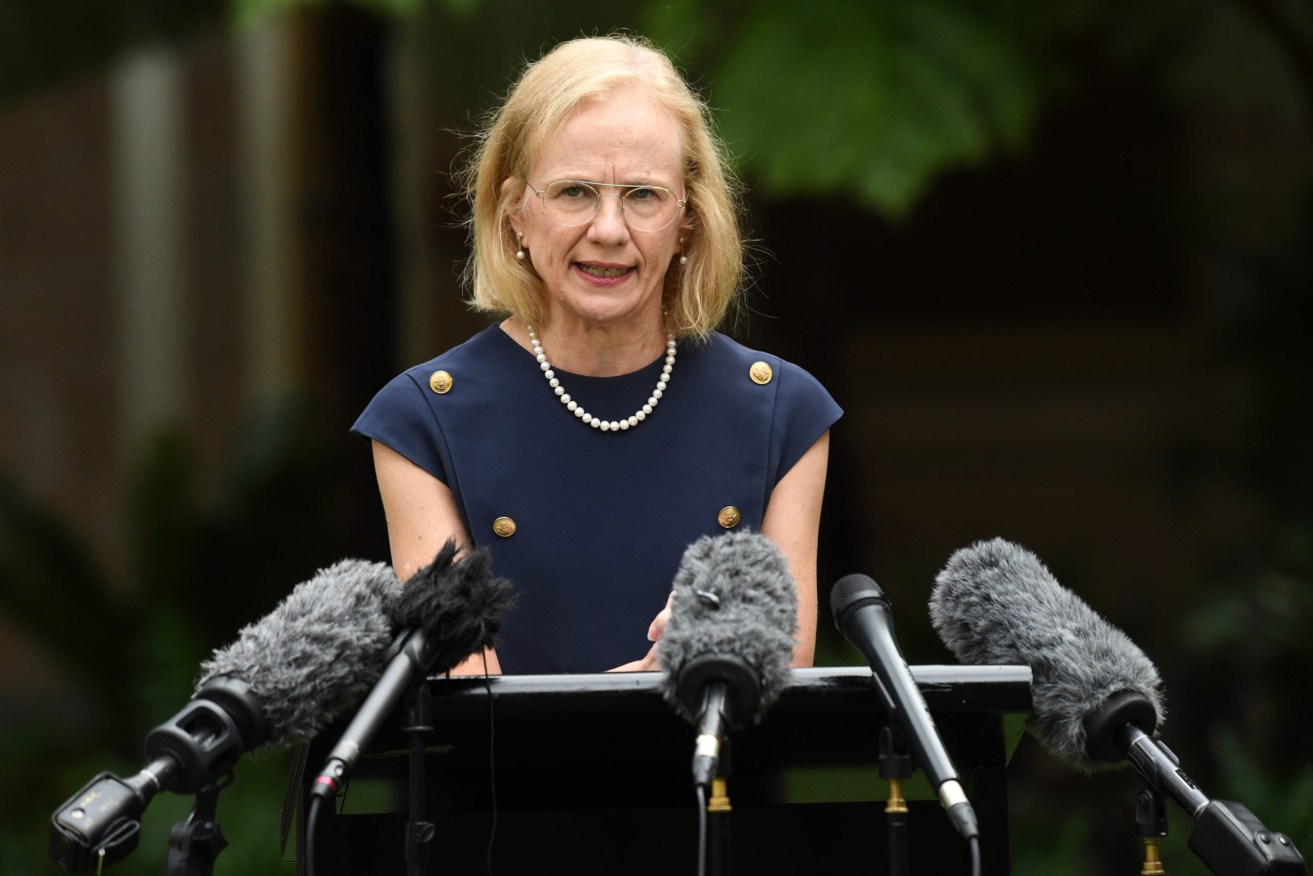Queensland’s first virus death in a year amid fears PNG floodgates set to open
An 80-year-old man who died of COVID-19 overnight was infected overseas. Soon, hundreds more people will be allowed to fly into the state each week.

Queensland Chief Health Officer Jeannette Young. (AAP Image/Darren England)
Chief Health Officer Jeannette Young said the man, an Australian, had flown back from the Philippines via Papua New Guinea on March 20. He tested positive in hotel quarantine five days later.
The man was treated in the intensive care unit of Brisbane’s Prince Charles Hospital but died late yesterday of complications from the virus.
A week earlier, dual PNG-UK national Malcolm ‘Kela’ Smith died in Redcliffe hospital after contracting the virus in PNG. His death wasn’t added to Queensland’s tally because of his nationality and the fact he was diagnosed overseas.
The 80-year-old man officially becomes Queensland’s seventh COVID-19 death, the first in 12 months, even though the man had been living in the Philippines.
“He is an Australian and he had been living there for a while,” Young said, confirming he was also diagnosed in Queensland.
The PNG links are particularly worrying, given Australia’s nearest neighbour is in the grip of an epidemic. The number of people bringing COVID-19 to Queensland from PNG prompted travel restrictions that are set to be eased overnight.
Only one of Queensland’s seven COVID-19 deaths was a result of local transmission of the virus, and she died in Sydney. The other five deaths were among people who had been infected on international cruise ships.
Health Minister Yvette D’Ath said Queenslanders should get a COVID-19 vaccine as soon as possible.
“This is another reminder that this is a deadly virus and that we are still seeing thousands of people around the world, on a daily basis, dying of Covid,” D’Ath said.
While the man had transited through PNG, Young said he was believed to have been infected in the Philippines and only travelled that way because of available flights.
Another two cases of COVID-19 were confirmed overnight, both overseas-acquired and detected in hotel quarantine.
A cap on the number of passengers flying in from PNG will be raised at midnight. It was crucial in allowing Queensland Health to get recent outbreaks under control.
In an extraordinary move, the Palaszczuk government asked the Morrison government to impose the lower cap so it could deal with community-acquired COVID-19 cases in greater Brisbane.
As Queensland Health responded to what ended up being two outbreaks involving the contagious UK variant, the Hotel Grand Chancellor and the Princess Alexandra Hospital, the need to hospitalise all infected patients had become a serious challenge.
Dozens of hospital beds were already taken up by travellers who brought the virus from overseas, mostly PNG. In Cairns, the bed block had a flow-on impact to other health services, so some sick travellers had to be flown on to Brisbane.
The biggest reprieve came from the cap of only 650 international travellers being allowed into Queensland each week. That drastically reduced the risk and patient load from PNG, even allowing for days where Queensland, which resorted to a lockdown to contain the outbreaks, recorded no new cases of COVID-19 at all.
However, the cap will be raised to 1,000 at midnight – an Air Niugini flight from Port Moresby will land in Brisbane tomorrow morning – with the Commonwealth also expecting “surge capacity” of an extra 300 travellers as soon as possible.
Young today said charter flights from PNG were still on hold, affecting fly-in/fly-out mining workers, but she was pleased to see mining companies doing more to protect their workers in PNG.
Over the past month, the number of active COVID-19 cases in PNG has increased around 700 per cent, to more than 7,500 this week. While the numbers are thought to be conservative, on some days there are more deaths reported in PNG than Queensland has experienced throughout the entire pandemic.
There are strong community ties between PNG and Queensland, which is one of the reasons travel is still allowed.
The Morrison Government has sent medical teams and AstraZeneca vaccines to PNG, where the risk of transmission apparently outweighs the risk of blood clots that has disrupted Australia’s vaccination rollout.
“Around the world, COVID-19 is still rife,” Prime Minister Scott Morrison said in a social media address on Monday, confirming he would no longer set targets for Australia to be vaccinated.
“We are still seeing increases in daily cases, particularly in the developing world. We’re seeing that right now up in Papua New Guinea, for example, where we’re reaching out to give them a helping hand.”
Efforts to protect the Torres Strait, using AstraZeneca vaccines, have been put on hold while the new advice for under 50s is considered. Like PNG, communities in the Torres Strait are younger on average, and may require a shift to the Pfizer vaccine.
The Department of Home Affairs has been unable to release data on the total number of PNG travellers coming into Queensland to allow InQueensland to calculate the infection rate, however it is much higher than among travellers from other countries. Some parts of PNG have done screening tests showing half the population is infected.
The strength of Australia’s hotel quarantine system is now set to be tested again, against more contagious variants of COVID-19, with Victoria now also taking in more international travellers.
Queensland restrictions, including mandatory masks, are due to be lifted on Thursday.












